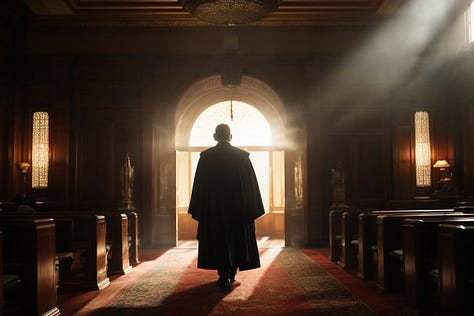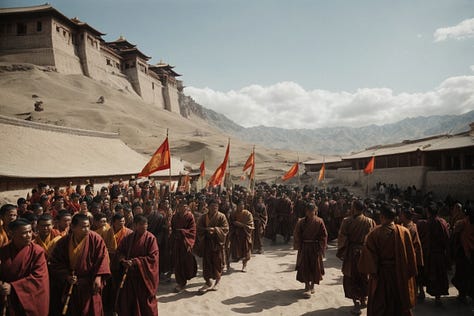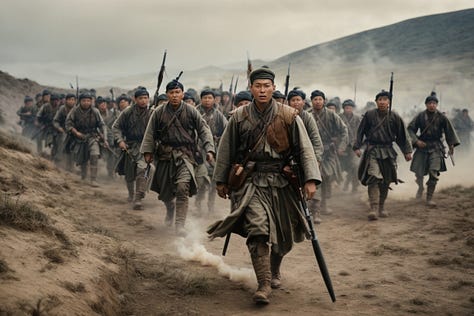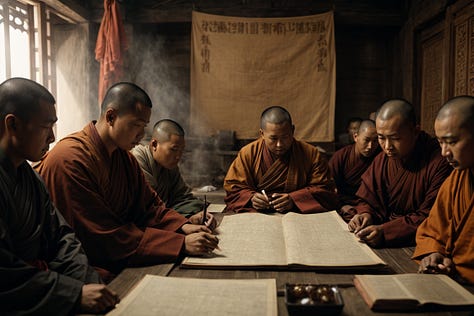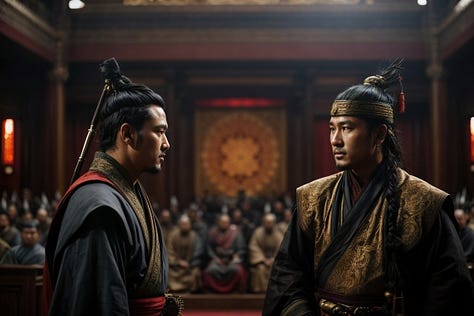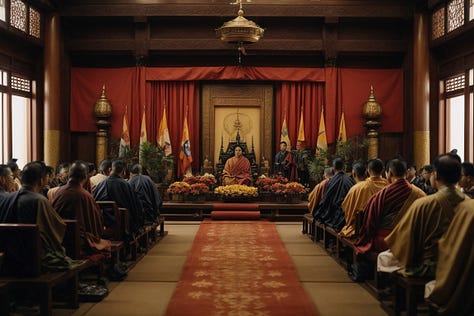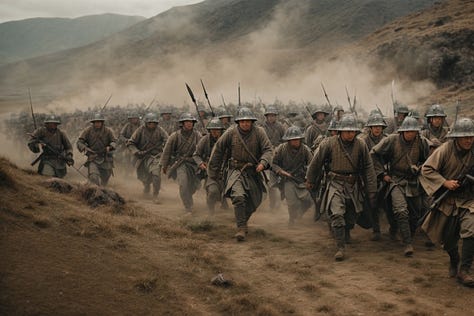The Salvation of Bod
Chapter 6
In the grand council chamber, a space once alive with the fiery debates of the great houses of Bod, Darje's thunderous presence transformed the turmoil into a spellbinding hush. The room, adorned with relics of a storied past and the heavy table around which the fates of nations had been decided, became a stage for a singular, commanding performance.
Darje stood, his stature magnified by the intensity of his conviction, his gaze sweeping across the council with the authority of a born leader. The shattered desk, remnants of the council's earlier discord, lay as a stark reminder of their fractured unity. An elder, gripping the weaponized leg of a chair, became a symbol of their impotence, his raised arm frozen in a tableau of suspended violence.
“You dare to sit as guardians of our people, yet you descend into petty squabbles as our enemies breach our borders?” Darje’s voice resonated with a mixture of disappointment and challenge, cutting through the air like a blade. His words struck at the heart of their indecision, a call to awaken from their inertia.
The council members, these venerable figures of wisdom and power, now seemed diminished, their eyes downcast, unable to withstand the piercing scrutiny of Darje’s judgment. “I am Darje, the one who vanquished Gyalwa and Sakyanyinguo, the one feared and revered in equal measure. And this chaos, this indecision, is what I return to?”
His rhetorical question hung in the air, a damning indictment of their failings. One by one, heads began to nod, the tide turning in favor of this young, dynamic figure who had burst into their midst like a force of nature. His strategic acumen, his unshakable resolve, began to kindle a flame of hope in their beleaguered hearts.
Yet, as Darje laid out his bold vision for a united defense and a counteroffensive, there was one among them who remained unmoved. Kanshin of the Gelug, a man of pride and ambition, could not conceal his simmering resentment. As Darje spoke of leading their people to victory, of facing the Scourge from the East, Kanshin's face hardened into a visage of barely contained fury.
With the conclusion of Darje's fiery oration, a silent standoff ensued. The air was thick with unspoken tensions, the room charged with the electricity of a pivotal moment in history. And then, with a suddenness that mirrored Darje's entrance, Kanshin rose. His departure was not just a physical exit from the chamber but a symbolic severance from the unity that Darje sought to forge. The door swung shut behind him with a resounding thud, leaving a wake of uncertainty and a council now divided by an unbridgeable chasm of ideology.
In that moment, as the echoes of Kanshin's exit faded, Darje stood not just as a military commander but as a figure of transformational leadership, ready to steer his people through the tumult of war and into the annals of legend.
In that charged moment, Darje stood not just as a warrior or a monk, but as a unifying force, a leader capable of rallying a fragmented people under a single banner. His words, fierce and unflinching, had kindled a flame of hope in the hearts of the council. Yet, the absence of Kanshin's support was a stark reminder that unity was fragile, and the path ahead would be fraught with challenges both within and without. The Salvation of Bod was more than a mere battle; it was a struggle for the very soul of their land, and Darje, once a solitary figure on a personal quest, now stood at the forefront of a collective destiny.
The dismissal of Kanshin's absence from Darje's mind was as swift as it was definitive. He had harbored no fondness for the man, his memories tainted by the Gelug's past transgressions against his people. To Darje, Kanshin and his warriors represented nothing but a legacy of exploitation and cowardice. With a newfound sense of purpose, Darje turned his attention to the task at hand, his disdain for the Gelug fading into the shadows of his resolute focus.
As he stepped among the elders, their awe at his presence palpable, Darje's demeanor shifted from fiery outrage to a calm, commanding presence. He began to outline his strategy for the military alliance, his voice echoing with authority and conviction. "As supreme military commander, I shall oversee our tactical efforts. This council will provide the necessary support – food, clothing, and all that our army requires to endure."
As he spoke, the fire in the hearth waned, yet the fervor in his words ignited a flame of confidence within the elders. His plans were met with nods of approval, his authority now unquestioned and deeply ingrained in their collective consciousness.
"Sumosakya, as the heart of our alliance and our strongest fortress, will be our final stand and our rallying point," Darje declared, his voice resonating with the power of his newfound leadership. "I hereby summon all able monks from across Bod to gather here, prepared for war." At his command, a flurry of messages were dispatched, carried swiftly by servant boys into the night.
Turning to the council, Darje's next words were firm and direct. "Ensure that our army is well-provisioned." Another message vanished into the darkness. His final decree echoed through the hall, "Now, I seek rest. Guide us to our quarters."
The meeting dispersed at the behest of the supreme commander, the delegates retiring to their lodgings, while Darje and his men were escorted to a grand wooden building near the central hall. This abode, clearly designed for esteemed guests, offered comforts unfamiliar to the weary travelers. Luxuries abounded, and at the sight of a feather bed, Darje surrendered to its embrace without hesitation, his body sinking into its softness, a stark contrast to the harsh realities he had faced and the monumental task that lay ahead.
In the burgeoning light of dawn, the monastery of Sumosakya, nestled amidst the towering guardians of Bod, was no longer a sanctuary of contemplative repose but a stronghold bracing for impending conflict. Here, Darje stood, not merely as a figure of martial prowess but as the architect of a resistance that would echo through the ages. His presence, like the unfurling banner of an ancient general, galvanized the monks into action, transforming the hallowed grounds into a hive of warlike preparation.
The once-quiet corridors and courtyards of the monastery buzzed with fervent activity. Monks, who had once devoted themselves to the pursuit of spiritual enlightenment, now found a new purpose in the forging of a unified front against the encroaching forces. Their arrival from every corner of the Bodian landscape marked a seismic shift in the annals of their history, each monk a living bridge between the serene teachings of their faith and the grim necessities of war.
The sound of hammering and the sawing of wood punctuated the air as makeshift barracks and armories took shape. The monastery, revered for its ancient wisdom and tranquil beauty, now echoed with the urgency of a military camp in the making. Monks, robed in the traditional garb of their orders, worked alongside the civilian volunteers, their hands more accustomed to the gentle turning of prayer wheels now deftly constructing defenses and fortifications.
At the center of this whirlwind of activity was Darje, his figure a constant presence amidst the organized chaos. With a clarity of vision that belied his years, he directed the flow of resources and personnel, his orders carried out with an efficiency born from his time in the underground brotherhood. His team, a cadre of seasoned survivors from his past life, moved with a precision that spoke of their shared experiences in the shadowy world of espionage and rebellion.
The very air of Sumosakya seemed to thrum with a new energy, charged with the collective determination of its inhabitants. Monks and laymen alike found a renewed sense of purpose under Darje's leadership, their actions not just a response to the threat of invasion but a manifestation of a deeper, more profound calling.
As the sun crested the high peaks of Bod, casting its first light on the bustling monastery, it illuminated a scene of profound transformation. Sumosakya had become the heart of a resistance, a beacon of hope in a time of darkness. And at its core was Darje, the young monk from the snow-capped mountains, now a leader of men, poised to write a new chapter in the history of his people. The salvation of Bod, a dream that had once seemed a distant echo in the annals of time, was now a tangible reality, unfolding with each passing moment under Darje's guiding hand.
In the burgeoning light of dawn, the monastery of Sumosakya, nestled amidst the towering guardians of Bod, was no longer a sanctuary of contemplative repose but a stronghold bracing for impending conflict. Here, Darje stood, not merely as a figure of martial prowess but as the architect of a resistance that would echo through the ages. His presence, like the unfurling banner of an ancient general, galvanized the monks into action, transforming the hallowed grounds into a hive of warlike preparation.
The once-quiet corridors and courtyards of the monastery buzzed with fervent activity. Monks, who had once devoted themselves to the pursuit of spiritual enlightenment, now found a new purpose in the forging of a unified front against the encroaching forces. Their arrival from every corner of the Bodian landscape marked a seismic shift in the annals of their history, each monk a living bridge between the serene teachings of their faith and the grim necessities of war.
The sound of hammering and the sawing of wood punctuated the air as makeshift barracks and armories took shape. The monastery, revered for its ancient wisdom and tranquil beauty, now echoed with the urgency of a military camp in the making. Monks, robed in the traditional garb of their orders, worked alongside the civilian volunteers, their hands more accustomed to the gentle turning of prayer wheels now deftly constructing defenses and fortifications.
At the center of this whirlwind of activity was Darje, his figure a constant presence amidst the organized chaos. With a clarity of vision that belied his years, he directed the flow of resources and personnel, his orders carried out with an efficiency born from his time in the underground brotherhood. His team, a cadre of seasoned survivors from his past life, moved with a precision that spoke of their shared experiences in the shadowy world of espionage and rebellion.
The very air of Sumosakya seemed to thrum with a new energy, charged with the collective determination of its inhabitants. Monks and laymen alike found a renewed sense of purpose under Darje's leadership, their actions not just a response to the threat of invasion but a manifestation of a deeper, more profound calling.
As the sun crested the high peaks of Bod, casting its first light on the bustling monastery, it illuminated a scene of profound transformation. Sumosakya had become the heart of a resistance, a beacon of hope in a time of darkness. And at its core was Darje, the young monk from the snow-capped mountains, now a leader of men, poised to write a new chapter in the history of his people. The salvation of Bod, a dream that had once seemed a distant echo in the annals of time, was now a tangible reality, unfolding with each passing moment under Darje's guiding hand.
As the sun dipped below the towering peaks of Bod, casting long shadows over the growing army, Darje felt a heavy responsibility settle upon his shoulders. This was no longer just about reclaiming a homeland or fulfilling an ancient prophecy. It was about uniting a fractured people, about forging a new future from the ashes of the past. The war ahead was not just a battle for territory; it was a fight for the soul of Bod itself.
As the first light of dawn illuminated the rugged terrain of Bod, a new chapter in its storied history was about to be written. The eastern army, a formidable force that had vanquished the Nyingma compound, now encroached further into the sacred lands of Bod. Darje, upon receiving the grim tidings of their advance, felt a searing rage ignite within him. The easterners had not only crossed physical boundaries but had also desecrated the sanctity of their spiritual haven. It was an unforgivable transgression that demanded retribution.
With the gravitas of a seasoned commander, Darje addressed his assembled soldiers in the courtyard of Sumosakya. His voice, resonating with the urgency of the moment, stirred the hearts of his men. The air was charged with a mix of fear, anticipation, and unwavering determination. Under the shadow of the monastery, a silent vow was taken—a vow to protect their homeland against the marauding invaders.
In the crisp morning air, Darje led his eclectic army – his eight Indian brothers-in-arms, a cadre of forty-five battle-hardened monks, and a contingent of eighty-nine civilian volunteers. Among them, a handful wielded rifles, weapons that represented the merging of old traditions and new necessities. They traversed treacherous mountain passes, a caravan of grim resolve, following the trail of the enemy.
After two arduous days, their patience was rewarded. In a narrow pass, where the mountains rose like silent sentinels, they found the unsuspecting eastern army. Darje's strategy was as cunning as it was bold. He positioned his riflemen on the high ridges flanking the pass, their presence concealed by the jagged terrain. The monks, robed and stealthy, waited in ambush, their weapons ready.
As the last of the eastern soldiers entered the trap, Darje gave the signal. A thunderous volley of gunfire erupted from the ridges, catching the enemy unawares. The initial barrage was devastating, felling many before confusion could turn to resistance. Then, with the ferocity of a mountain storm, Darje and his monks descended upon the beleaguered soldiers. The monks, like avatars of wrath, tore through the enemy ranks with a whirlwind of steel and fury.
The eastern army, unprepared for such fierce resistance, broke ranks and fled in disarray. Darje, leading the charge, was a blur of motion, his blade singing a deadly tune. His monks followed suit, their disciplined onslaught leaving no hope for the retreating enemy. Bodies littered the pass, a grim testament to the ferocity of their defense.
The victory cry that rose from Darje's men echoed off the mountain walls, a sound that carried both triumph and sorrow. It was a decisive victory, one that stemmed the tide of the eastern advance, but at a cost that weighed heavily on Darje's soul. As he stood amidst the aftermath, the setting sun casting long shadows over the battlefield, Darje knew that this was but the first of many battles in the war to reclaim Bod. The path ahead was fraught with peril, but with each step, Darje was determined to forge a legacy worthy of the land he had sworn to protect.
The return of Darje and his gallant company to Sumosakya was heralded as a glorious triumph, a spark of victory that ignited hope in the beleaguered hearts of Bod. The tales of their daring exploits at the mountain pass, where they had vanquished half of the Chinese division, resonated through the region with the fervor of an epic saga. Darje, once a humble monk from the Kagyu, ascended as a symbol of hope and resilience, his name synonymous with courage and tactical brilliance. His reputation burgeoned, sweeping across the land like a cleansing storm, revitalizing the spirits of those who called Bod home.
Monks, drawn by the magnetic pull of Darje's valorous deeds, journeyed from distant monasteries to pledge allegiance to his cause. His ranks swelled prodigiously, the monastery of Sumosakya transforming into a bastion of strength and unity. The thousand-strong army of monks, augmented by the fervent zeal of civilian volunteers, stood as a formidable force, a testament to Darje's inspirational leadership.
In the heart of the conflict, where the might of Bod clashed against the iron will of the Chinese forces, Darje emerged not just as a commander but as an emblem of resilience. The mountains of Bod, once a haven of peace and contemplation, now echoed with the clamor of battle. The Chinese, embittered by their defeat at the pass, unleashed their fury in waves of unrelenting aggression, their soldiers advancing like a relentless tempest across the rugged terrain.
Darje, standing resolute against this onslaught, became the fulcrum around which the fate of Bod pivoted. With each maneuver, each tactical retreat, and every counteroffensive, he displayed a mastery of warfare that seemed almost supernatural. His strategies were a blend of ancient monastic teachings and the ruthless pragmatism learned from his time in the underground. Each skirmish, though often a pyrrhic victory, was a testament to his unwavering spirit and tactical genius.
As tales of his exploits spread like wildfire through the ranks and beyond, Darje's reputation transcended the physical boundaries of Bod. His name was whispered in awe in distant lands, and his military maneuvers became subjects of study and admiration. He was the stormbringer, the protector, the beacon of hope in a time when darkness threatened to consume their world.
Yet, in the shadows of this burgeoning legend, dissent festered. Kanshin of the Gelug, once a respected name in the council of elders and a potential leader of the united forces, now stood as a silent specter of opposition. His refusal to join Darje's coalition was a thorn in the side of the united front, a silent rebellion that spoke of deeper divisions within the ranks of Bod.
The mystery of the Gelug's silence only deepened the sense of foreboding that hung over the war-torn landscape. Whispers of conspiracy, of secret pacts and hidden agendas, swirled through the ranks of the defenders. In the absence of their voices, the Gelug became an enigma, a question mark looming over the already complex tapestry of the war.
In this crucible of conflict, Darje stood as the unyielding bastion against the encroaching darkness. His journey from a secluded monk to the supreme commander of an army was a tale woven into the very fabric of Bod's destiny. And as he faced each day with the courage of a thousand men, the fate of his homeland, the legacy of his people, and the future of a nation rested upon his shoulders. The war for Bod was not just a battle for land; it was a struggle for the soul of a people, and Darje was at its epicenter, a warrior monk whose legend would endure through the annals of time.
In the heart of Sumosakya, Darje stood as a beacon amidst the storm, his vision unwavering, his resolve unbreakable. His army, a diverse tapestry of monks and civilians, rallied around his banner, their faith in his leadership unshaken. Darje's journey from the solitary paths of spiritual pursuit to the tumultuous realm of warfare was a tale etched in the annals of Bod, a saga of transformation, courage, and the unyielding will to defend one's homeland against overwhelming odds.
In the heart of Sumosakya, Darje strategized tirelessly, his mind a labyrinth of plans and countermeasures. The monastery had transformed into a fortified bastion, a last stand against the encroaching tide of war. Despite the mounting pressure and the ever-looming threat of the Chinese army, the morale within Sumosakya's walls remained unshaken. The monks and civilians, inspired by Darje's unyielding spirit, prepared to defend their sanctuary to the last.
In the midst of this tumultuous theater of war, Darje stood as a colossus, his resolve unbreakable, his leadership unquestioned. He had become more than a commander; he was the heart and soul of the resistance, a symbol of Bod's indomitable will. The story of Darje, the Kagyu monk turned supreme commander, was etched into the annals of Bod's history, a tale of courage, sacrifice, and unshakeable determination in the face of overwhelming odds.

